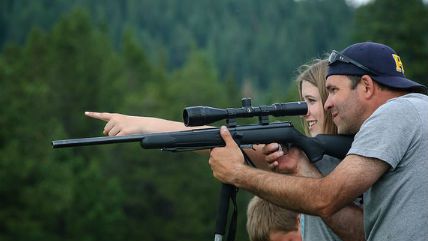Self-Help for Soft Targets
Unlike Obama's gun control proposals, armed citizens can stop mass shooters who are invisible until they strike.

There is not much the government can do about the sort of terrorist threat that President Barack Obama described in his speech following the massacre in San Bernardino. It will always be difficult to stop self-radicalized jihadists, operating under no one's instructions, from carrying out attacks on soft targets too scattered and numerous to secure.
The only viable alternative, self-help, is one that Obama seems ideologically incapable of considering. His proposals for new restrictions on firearms move in the opposite direction, based on the assumption that the problem is too many guns in too many hands.
Gun control supporters generally dismiss the notion that armed citizens can help stop terrorists and other mass shooters. They argue that unbadged amateurs will be frozen by fear, that they will accidentally shoot innocent people, or that police will mistake them for bad guys.
These possibilities do not negate the lifesaving potential of encouraging greater self-reliance when waiting for police to arrive means waiting for coldblooded murderers to kill and kill again. We know that intervention by people already at the scene can make a crucial difference.
Last October, UCLA law professor and Washington Post blogger Eugene Volokh listed 10 cases where bystanders used firearms to disable, detain, or scare away gunmen who had shot people or threatened to do so. The examples included a Mississippi high school principal, a Philadelphia barbershop customer, a Colorado Springs churchgoer, and a Chicago Uber driver.
As Volokh noted, such interventions seem to be rare—not surprising, since so many mass shootings occur in "gun-free" zones where law-abiding people are disarmed. But bystanders with firearms demonstrably can save lives, which is more than you can say for Obama's proposals.
The perpetrators of the San Bernardino attack did not have criminal or psychiatric records that would have legally disqualified them from buying guns. In fact, one of them passed background checks when he bought pistols from California gun dealers. Obama's recommendation of "universal background checks" in response to the San Bernardino massacre is therefore a non sequitur.
Likewise his suggestion that people on the federal No Fly List should be barred from buying guns. Leaving aside the constitutional problems with stripping someone of his Second Amendment rights based on nothing more than an unverified suspicion, the San Bernardino killers were not on the No Fly List or the FBI's so-called Terrorist Watchlist.
Obama's other proposal—banning the rifles used in the attack, which he described as "assault weapons" even though they did not qualify as such under California law—at least had something to do with the actual facts of the case. But there is no reason to think arbitrarily prohibiting firearms based on their scary, military-style looks will impair the ability of terrorists to kill innocent people.
Other gun control advocates would go further. The New York Times called for mass confiscation of guns "to reduce their number drastically" by "eliminating some large categories of weapons and ammunition." It did not get much more specific than that, although Times columnist Gail Collins claimed "semiautomatic weapons"—a category that includes many hunting rifles and almost all modern handguns aside from revolvers—"are totally inappropriate for either hunting or home defense."
The Los Angeles Times, which doesn't think the Second Amendment protects any rights the government must respect, demanded a federal ban on "military-style weapons," a limit on the size of magazines, and background checks when parents give guns to their children. It also would "get rid of most concealed-carry laws."
The reasoning behind that last suggestion is hard to fathom. In the face of self-directed terrorists who are invisible until they strike, the last thing we should do is prevent law-abiding Americans from carrying guns. Autonomous terrorism calls for autonomous defense.
This article originally appeared in print under the headline "Self-Help for Soft Targets."


Show Comments (27)